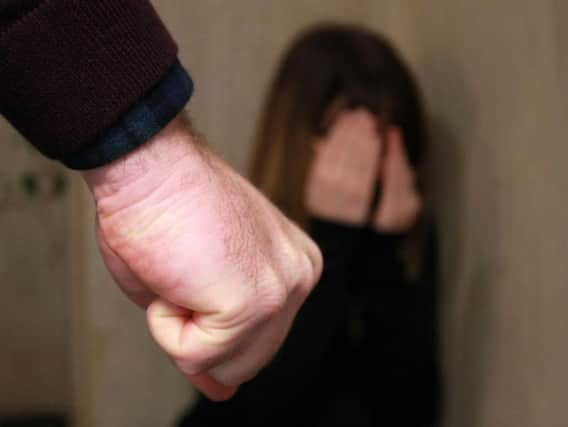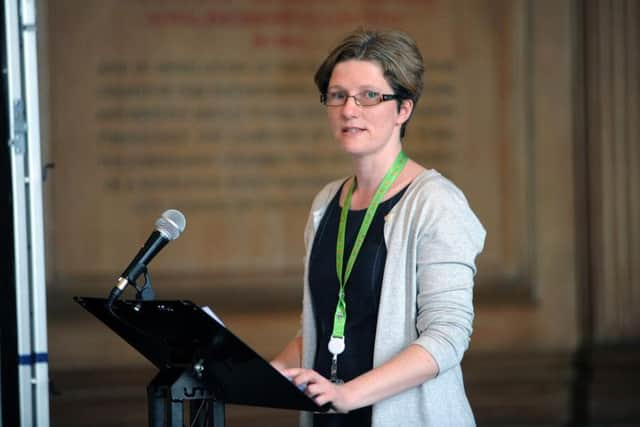Leeds domestic abuse victims urged to get help as stats reveal extent of problem


Nearly 20,000 "domestic incidents" were reported to the police in the 12 months up to September this year, according to a new report, with officers receiving 53 calls on average every day in the city.
The Domestic Violence and Abuse Breakthrough Project 2017 document, which will be discussed today by Leeds City Council’s Executive Board, shows the work that the authority and its partner agencies have carried out over the last year or so to try and stem the problem.
Advertisement
Hide AdAdvertisement
Hide AdBut an increase in such behaviour is expected over the Christmas period.


Louise Hackett, head of safeguarding at Safer Leeds, said: “We always get spikes, but services are open – certainly LDVS [Leeds Domestic Violence Service] over the Christmas period – and police are available for contact. I would always encourage people.
“Often it’s that people hold it together over Christmas and don’t seek support until the new year. People with children try and manage over Christmas.”
The report also reveals that 44.5 per cent of the 19,591 reported incidents involved repeat victims, with 47 per cent (9,211 incidents) being violent in nature. (Coercive and controlling behaviour which is not necessarily physically violent became an offence in December 2015.)
Advertisement
Hide AdAdvertisement
Hide AdA child was present in nearly 6,000 of the instances, with women being the victim in 13,781 of the cases (76.7 per cent) and men in 3,746 (20.8 per cent) of them.


The Domestic Violence and Abuse Breakthrough Project, which has been taking place in Leeds for more than a year, works with different communities and organisations across the city.
From March 2016, a range of statutory bodies responsible for tackling domestic abuse in the city have met daily for the Front Door Safeguarding Hub (FDSH) instead of just monthly as in previous years.
They discuss pressing cases and incidents which have happened with the aim of intervening early to help those involved – sometimes signposting services to those in police custody – and deciding which service best suits the victim to avoid the confusing process of many people getting in touch.
Advertisement
Hide AdAdvertisement
Hide AdCoun Lisa Mulherin believes that this approach “puts the pieces of the jigsaw together” in a system which over previous years meant “weeks” could go by without relevant authorities speaking to each other about cases.
And the council’s executive member for children and families said that the new approach tries to tackle something that has been a “taboo for generations”.
She said: “The figures speak for themselves. We know this is a huge issue globally, never mind in Leeds. We’re determined to do what we can to stop this happening in Leeds.
“Clearly it’s what goes on behind closed doors. It’s about how we can encourage people to come forward to seek help and make that as easy as possible for them.”
Advertisement
Hide AdAdvertisement
Hide AdSpecialist domestic violence services such as LDVS, as well as workforce development sessions, the LGBT+ Community Hub, children’s centres and a range of other places and options are involved.
The FDSH has close contact with schools and GPs to flag up domestics violence cases involving their pupils or patients.
Between April 2016 and March 2017, 4,531 notifications were made to schools. And from September 2016, 2,976 were made to GPs.
This is partly so that youngsters who turn up to school unprepared – not in uniform, for example – are not punished and can be supported.
Advertisement
Hide AdAdvertisement
Hide AdAnd in doctor’s surgeries in Leeds, unaccompanied women can now be routinely asked about domestic abuse.
The project has found that those who are asked about whether they suffer domestic violence “overwhelmingly” do not mind being questioned.
However there has been an increase in victims “self-reporting”, with 5,972 doing so in the 12 months up to September 2017, the report reads.
Ms Hackett said: “It’s not that people don’t want to know or engage - sometimes they are frightened of making things worse. We want people like hairdressers know how to respond, because people disclose differently to different people.
Advertisement
Hide AdAdvertisement
Hide Ad“I would always have the conversation: ‘Is there something happening at home?’ It’s always better to run the risk of offending someone than leaving someone in a dangerous situation, potentially.”
Some of the project’s work involves perpetrators themselves. Caring Dads is a group programme which allows abusers to address their behaviour and manage emotions.
Ms Hackett said: “I think we have to take a whole family approach to these issues. With perpetrators, there are some who are very aware that what they are doing is wrong and want to change. If people want to change we have to work out ways of helping them do that.”
She believes criminal measures are also sometimes needed, but said: “Victims don’t always want that. They want the situation to stop, they don’t want the father of their children to be criminalised for this.”
Advertisement
Hide AdAdvertisement
Hide AdAnd speaking about how such abuse affects the children involved, Coun Mulherin said: “Clearly it’s emotionally distressing and there are long-term impacts of that on their wellbeing and also what they perceive to be healthy relationships.
“If that is what the man in their home does and that’s not tackled, that’s got the potential to repeat itself.”
People can contact Leeds Domestic Violence Service on 0113 246 0401 or email [email protected]
A range of Leeds-based services and how to contact them are also advertised at http://www.leeds.gov.uk/c/Pages/domesticviolence/default.aspx